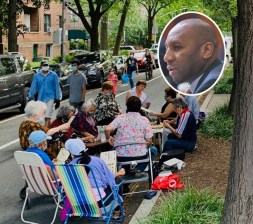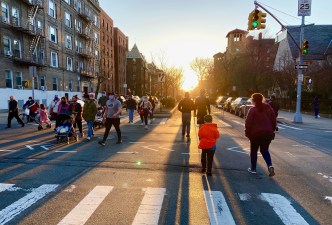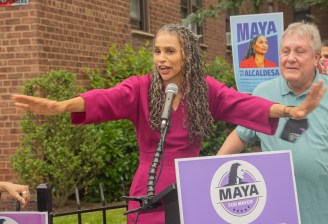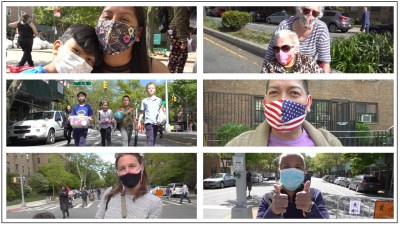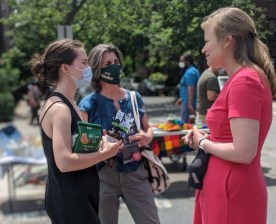OPINION: A Linear Park on 34th Avenue is ‘The Best Thing’ for People with Disabilities
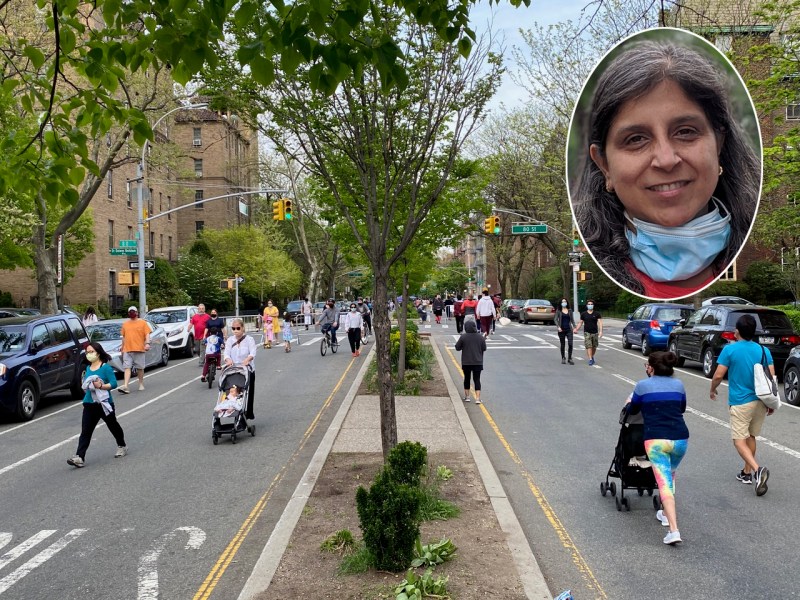
This is the seventh installment in our ongoing series of stories showing support for converting 34th Avenue in Jackson Heights and Corona into a linear park, which is the subject of a petition drive that seeks a logical final conclusion to what the Department of Transportation calls “the gold standard” of open streets. Earlier, we published support from Assembly Member Jessica González-Rojas, Borough President Donovan Richards, urban planner Donovan Finn and City Council candidate Shekar Krishnan, Council Member Danny Dromm, a video by Streetfilms, and from Jackson Heights resident Risa Procton. Today’s piece is by Sharmila Bedi and it comes as the Department of Transportation will soon reveal a plan for redesigning the open street that is expected to fall short of a full car-free conversion and bow to opponents of open space who cherish parking above their neighbors’ lungs and recreation space.

Some people who are opposed to our open street say they’re concerned about the elderly and disabled. But as a person with disabilities, I believe the best thing for my health and the health of my community is fresh air, green space, and a respite from traffic and pollution. That’s why I support the petition to create a linear park on 34th Avenue from the current open streets program, which has been called the program’s gold standard. Here’s why:
I never realized what bad shape the sidewalks were in until I needed a walker — as I walked gingerly along, trying to get fresh air after being shut in for months, alone.
When you use a walker or a wheelchair, you start seeing cracks in the pavement which you never noticed before. And then when people come your way, you have to zigzag. I recently learned that the sidewalks in my neighborhood, Jackson Heights, are among the narrowest in New York City and that we rank near-last for green space. In England, where I grew up, there are ample parks in every town, even in a big city like London.
My cancer was advanced by the time the pandemic hit — Stage 4 Multiple Myeloma. This disease attacks your bones, and they start to break. It attacks your vital organs. I was bedridden for three months. I came home in an ambulance. They lifted me, with the sheets, from bed to bed. When the pandemic hit, I was still re-learning how to walk. I have metal on one side, from my hip all the way down to my knee; I had a hip replacement and had my leg cut short. I could have coped with the cancer, but to be hit with both at the same time was just devastating.
Last spring, when 34th Avenue became an open street, I was so relieved to get off the broken sidewalk and have more space to walk. It’s hard to put into words how important 34th Avenue became. It was the key to my sanity. I developed a walking routine: I start at one end by my home and follow the numbers up, as far as I can. What I see always delights me:
- By the school, at 69th: children sliding on roller boards, while their teachers watch over.
- At 71st: young men exercising, with the median as a bench
- At 73rd: sunflowers in the center, I would stop and take photographs
- At 75th: a canopy of trees, a place to rest and chat with neighbors
I used to have to stop at 78th, but now I can make it all the way to 82nd.
I love the fresh air, the parade of neighbors and nature: dog walkers, people on cycles, kids skating, hawks soaring overhead. We came together but we weren’t directly together. It was like a safe haven — a chance to get out and see people and be with nature and breathe.
I love this open street; it’s almost like paradise. I’d be so devastated if they take the barriers down and it just becomes a street. It’d be devastating for our whole community.
We have such an incredible opportunity right now to take this street and make it into park space.
To people who oppose this, I say: The whole of New York City, really the whole world, is polluted by cars. You’re surrounded by pollution, so exactly where do we go? Where do I go? My cancer was brought on by the pollution caused by cars. I have to get fresh air. Where do older people like me, people who have a disability, go to experience nature? I can’t take the subway to Central Park. I can’t walk all the way to Flushing Meadows.
I hear some opponents claiming they oppose the open street out of concern that the park would block Access-A-Ride. I want to say to those people, that really reduces me to one dimension. I am about more than just needing to get to medical appointments.
Of course, city services should be prioritized, but we all agree on that. I would have Access-A-Ride pick me up at the nearest side street. It’s not that far. If we miss this opportunity to keep this little bit of nature we have seized in the city, it may never come again.
Signing the petition for the linear park made me feel a part of something larger than myself, an effort to build something lasting.
I’ll be long gone and the linear park would still be here. It would be my privilege, after all the joy it’s given me, if I can play a small role in helping make that happen.
Sharmila Bedi (formerly Moonga) is a retired technology teacher. She taught at a private school in Manhattan and helped children with their reading comprehension. She was born in Kenya, grew up in Southall, England and has lived the past 20 years in Jackson Heights.

